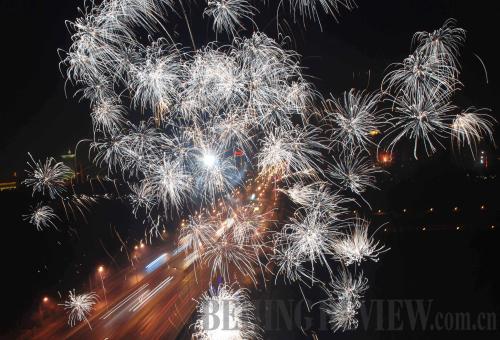|
 |
|
FIREWORKS FRENZY: Fireworks on the eve of the Spring Festival in Beijing (LI GANG) |
To ban firing
Accidents
It's necessary to adopt bans in China's large cities due to their scale, population densities and the increasing difficulties in keeping public safety.
Nowadays, urbanites are relatively richer and can buy greater numbers of fireworks, and the spaces between tall buildings are not wide enough, the danger of accidents triggered by fireworks is much greater than that in country areas. What's worse, when big fires occur, it's hard for people living in big buildings to get out.
Statistics from the website of the Ministry of Public Security show that from February 2 to 8, 11,813 fire accidents took place across the country, causing 40 deaths, 37 injuries and more than 56 million yuan ($8.5 million) of economic loss.
That figure did not include the big fire caused by fireworks in the early morning of February 3, which burnt down a 152-meter-high building in Shenyang, capital of northeast China's Liaoning Province, and caused a 3-billion-yuan ($45 million) loss.
A forest fire caused by fireworks caused six deaths and three injuries in Chun'an County of east China's Zhejiang Province on February 5.
In Hangzhou, capital of Zhejiang, in less than 60 minutes in the early morning of February 3, about 30 fire accidents occurred, mostly connected to fireworks. On the eve of the Chinese Lunar New Year, the number of fires caused by fireworks in Beijing increased by 178 percent year on year. Some provincial capital cities had more than 100 accidents and more than 100,000 fire fighters were sent out to deal with them.
A huge amount in administrative cost was caused because of these accidents. Fireworks bans in place for 12 years were lifted in 2005. As the Year of the Rabbit came to Beijing, more than 720,000 people had been sent out to patrol the city by 1:00 a.m. of February 3. The number was even higher than that for the 2008 Olympic Games.
Injuries
In Beijing, two were killed and 388 injured by fireworks during the seven-day Spring Festival holiday, the firework management office of Beijing said.
Beijing Tongren Hospital said, by the morning of February 11, more than 85 patients had come to the hospital for injuries caused by fireworks, among those were 78 caused to eyes. Also, about one quarter of the patients were children.
The number of patients has increased this year. Some of them were not hurt by fireworks set off by themselves but were injured when watching fireworks, said Lu Hai, a doctor at the Beijing Tongren Hospital.
Although governments of different levels have been placed on a state of high alert about the dangers of fireworks, accidents are bound to happen whenever bans on fireworks are lifted. We should protect our own culture but we should also protect people's safety. Nowadays, a Spring Festival holiday is like experiencing a war for some people since danger crops up anywhere in a city. A modern society is first a civilized society which protects people's safety and rights.
Setting off fireworks can bring happiness to people and human-based care and protection also do that. Comparatively speaking, the latter is more important.
Pollution
Setting off fireworks also brings about serious environmental cost, filling the air with high levels of sulfur and thick smoke, and pushing up the air-pollution index across large cities.
In China's environmental standards, an index below 50 indicate excellent air quality, while results of up to 100 are considered good. Anything above 100 is a sign of pollution. Figures from the Ministry of Environmental Protection show in 22 of China's 86 largest cities their air-pollution indexes rise past 100 on February 7. The situation was worse on February 3, the first day of the lunar New Year. Fireworks pushed the indexes to pollution levels in 56 cities. Four were considered seriously polluted.
Besides air pollution, China's traditional celebration of a new year also brings about huge amounts of trash across the country. For instance, statistics from the Shanghai Greenery and Public Sanitation Bureau show more than 1,000 tons of rubbish was produced as a result of the celebration in Shanghai on the fifth day of the lunar New Year, almost the same as on February 3, the first day of the New Year. This not only increases the burden of environmental protection workers but runs counter to low carbon and environment-friendly concepts we advocate. | 